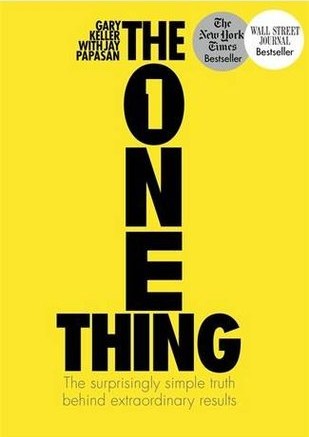
The One Thing is a book written by Gary Keller and Jay Papasan, which focuses on the concept of achieving success by simplifying one’s approach and focusing on the most important task at hand. In a world where we are constantly bombarded with distractions and have an endless to-do list, The One Thing presents a simple yet powerful philosophy to help people prioritize their work and achieve their goals.
The central premise of the book is that focusing on one thing, the most important task at hand, can have a profound impact on one’s life and work. The authors argue that success comes from doing one thing exceptionally well, rather than trying to do everything at once. By focusing on the one thing that matters most, individuals can achieve extraordinary results in their personal and professional lives.
The book is divided into three parts: the lies we tell ourselves, the simple path to productivity, and the one thing. In the first section, the authors address the common misconceptions people have about productivity, such as multitasking and the idea that success comes from doing many things well. They argue that multitasking is a myth, and that trying to do too many things at once leads to diminished performance and increased stress. Instead, they advocate for focusing on one thing at a time and devoting all of one’s energy and attention to that task.
In the second section, the authors present a simple path to productivity, which involves four steps: focus, mastery, purpose, and accountability. They argue that these four principles are essential for achieving success in any area of life. The first step is focus, which involves identifying the one thing that will have the greatest impact on one’s goals. The second step is mastery, which involves becoming an expert in one’s chosen field. The third step is purpose, which involves understanding the why behind one’s goals. The fourth and final step is accountability, which involves creating systems and structures to ensure that one stays on track.
In the third and final section of the book, the authors delve deeper into the concept of the one thing. They argue that the one thing is not just a single task or activity, but a way of thinking and approaching one’s work. They suggest that individuals should ask themselves the following question: what is the one thing I can do right now that will make everything else easier or unnecessary? By answering this question, individuals can identify the most important task at hand and focus all of their attention and energy on that task.
The authors also provide practical advice on how to implement the one thing philosophy in one’s life. They suggest that individuals should create a daily habit of identifying their one thing and scheduling time to work on it without distraction. They also recommend creating a domino effect, where achieving one goal leads to the accomplishment of others. Finally, they emphasize the importance of taking action and making progress towards one’s goals every day.
In conclusion, The One Thing is a powerful book that presents a simple yet effective philosophy for achieving success in any area of life. By focusing on the one thing that matters most, individuals can simplify their approach, reduce stress, and achieve extraordinary results. The book provides practical advice and actionable steps for implementing the one thing philosophy in one’s life, making it a valuable resource for anyone looking to improve their productivity and achieve their goals.
